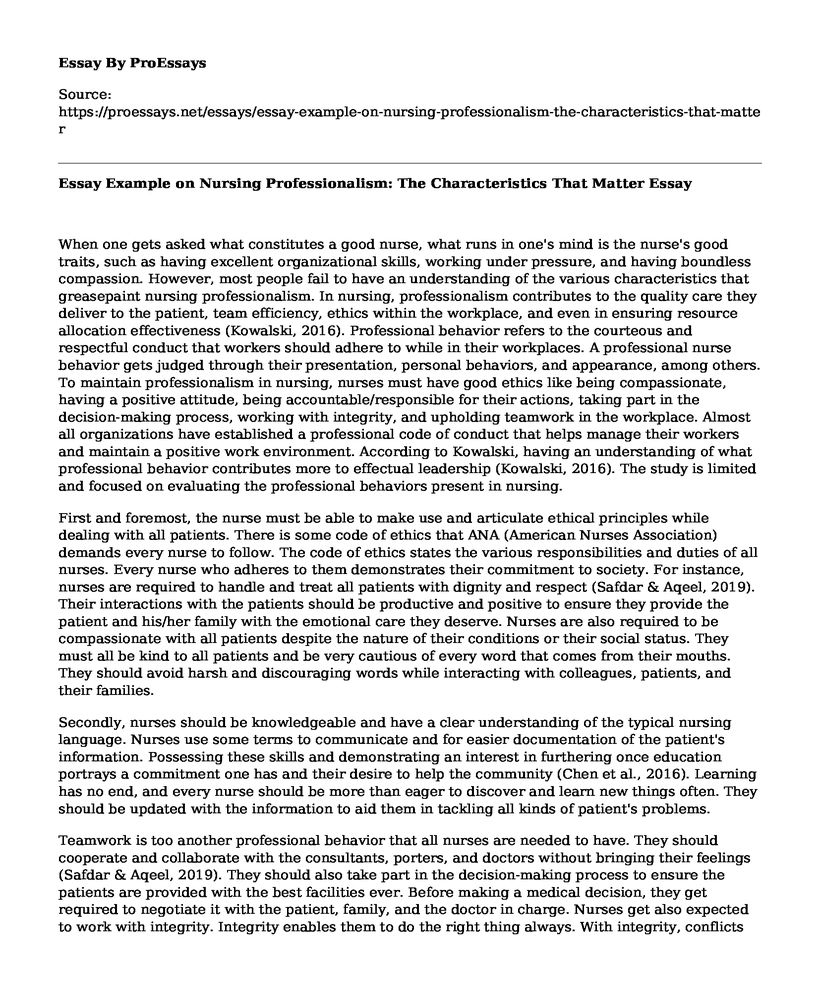When one gets asked what constitutes a good nurse, what runs in one's mind is the nurse's good traits, such as having excellent organizational skills, working under pressure, and having boundless compassion. However, most people fail to have an understanding of the various characteristics that greasepaint nursing professionalism. In nursing, professionalism contributes to the quality care they deliver to the patient, team efficiency, ethics within the workplace, and even in ensuring resource allocation effectiveness (Kowalski, 2016). Professional behavior refers to the courteous and respectful conduct that workers should adhere to while in their workplaces. A professional nurse behavior gets judged through their presentation, personal behaviors, and appearance, among others. To maintain professionalism in nursing, nurses must have good ethics like being compassionate, having a positive attitude, being accountable/responsible for their actions, taking part in the decision-making process, working with integrity, and upholding teamwork in the workplace. Almost all organizations have established a professional code of conduct that helps manage their workers and maintain a positive work environment. According to Kowalski, having an understanding of what professional behavior contributes more to effectual leadership (Kowalski, 2016). The study is limited and focused on evaluating the professional behaviors present in nursing.
First and foremost, the nurse must be able to make use and articulate ethical principles while dealing with all patients. There is some code of ethics that ANA (American Nurses Association) demands every nurse to follow. The code of ethics states the various responsibilities and duties of all nurses. Every nurse who adheres to them demonstrates their commitment to society. For instance, nurses are required to handle and treat all patients with dignity and respect (Safdar & Aqeel, 2019). Their interactions with the patients should be productive and positive to ensure they provide the patient and his/her family with the emotional care they deserve. Nurses are also required to be compassionate with all patients despite the nature of their conditions or their social status. They must all be kind to all patients and be very cautious of every word that comes from their mouths. They should avoid harsh and discouraging words while interacting with colleagues, patients, and their families.
Secondly, nurses should be knowledgeable and have a clear understanding of the typical nursing language. Nurses use some terms to communicate and for easier documentation of the patient's information. Possessing these skills and demonstrating an interest in furthering once education portrays a commitment one has and their desire to help the community (Chen et al., 2016). Learning has no end, and every nurse should be more than eager to discover and learn new things often. They should be updated with the information to aid them in tackling all kinds of patient's problems.
Teamwork is too another professional behavior that all nurses are needed to have. They should cooperate and collaborate with the consultants, porters, and doctors without bringing their feelings (Safdar & Aqeel, 2019). They should also take part in the decision-making process to ensure the patients are provided with the best facilities ever. Before making a medical decision, they get required to negotiate it with the patient, family, and the doctor in charge. Nurses get also expected to work with integrity. Integrity enables them to do the right thing always. With integrity, conflicts in the workplace get eliminated.
Conclusion
From the above discussion, it is evident that professionalism in the nursing profession plays a significant role in ensuring that better healthcare gets given to the patient. Professional behavior gets revealed through various characteristics a nurse portrays, such as their interactions with the patients, their demonstration of the nursing interest, their team work ability, and how they work with integrity. Professional behavior gets thus nurtured throughout their career life. Their attributes, which gets based on how an individual gets raised too contribute to their professional behavior.
References
Chen, Y., Watson, R., & Hilton, A. (2016). An exploration of the structure of mentors' behavior in nursing education using exploratory factor analysis and Mokken scale analysis. Nurse education today, 40, 161-167. https://hull-repository.worktribe.com/preview/433784/2017-03-10%2012838%20Watson.pdf
Kowalski, K. (2016). Professional Behavior in Nursing. The Journal of Continuing Education in Nursing, 47(4), 158-159. https://www.healio.com/nursing/journals/jcen/2016-4-47-4/%7B396fd9c7-4b9d-43ee-9456-501a1d403ae3%7D/professional-behavior-in-nursing
Safdar, S. A., & Aqeel, L. (2019). Grooming and etiquette as part of a nurse's professionalism: An essential curricular competency. Pakistan journal of medical sciences, 35(2), 404. https://www.ncbi.nlm.nih.gov/pmc/articles/PMC6500824/
Cite this page
Essay Example on Nursing Professionalism: The Characteristics That Matter. (2023, Aug 16). Retrieved from https://proessays.net/essays/essay-example-on-nursing-professionalism-the-characteristics-that-matter
If you are the original author of this essay and no longer wish to have it published on the ProEssays website, please click below to request its removal:
- The Article Retrospective Analysis of 140 Cases of Medullary Thyroid Carcinoma
- Getting Better Sleep Essay
- Summary of Fine Motor Activities in Head Start and Kindergarten Classrooms
- Exercise in the Immune System - Essay Sample
- Essay Sample on My Catalytic Event: Pursuing a Career in Medicine
- Essay on Kids' Pain Misunderstood: Assessing Difficulties in Diagnosing Pains in Children
- Inclusion of the Disabled: Evaluating How the Disabled are Empowered - Essay Sample







